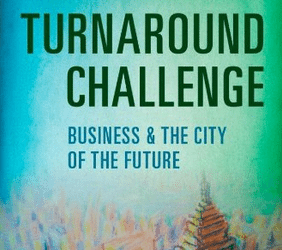

Books & Films
Book review: Turnaround Challenge by Michael Blowfield & Leo Johnson (2013)
A sustainability manifesto for businesses and cities, Michael Blowfield and Leo Johnson’s Turnaround Challenge: Business & the City of the Future outlines the steps required towards a more sustainable economy and prosperous society.
“This book is about the rights to optimism.” The first line of 2013’s Turnaround Challenge is an important one. Amid massive social and environmental challenges – climate change, resource depletion, pollution and population growth to name but four – few would criticise you if your predictions for the future were pessimistic. Two people on the optimism bench are Michael Blowfield and Leo Johnson.
Blowfield is an academic at the University of Oxford, Wolverhampton University and London Business School, while Johnson, is a sustainability expert and a partner at consultancy giant PwC, as well as being the brother of the mayor of London (who developed his own vision for a London of the near future last year). In an interview with Blue & Green Tomorrow in June, Johnson described his and Blowfield’s first joint publication, released in September, as “a tome that started in a really dark place, with all the carbon and population challenges, and ended up, weirdly, as a tidal wave of optimism.”
Turnaround Challenge discusses whether a better future is on the horizon. The authors’ answer is a resounding ‘yes’ – albeit with a few caveats. These mainly exist in how business and cities respond to the large-scale shifts. If successfully, a fairer, cleaner and more sustainable society beckons. If unsuccessfully, Petropolis or Cyburbia – two future city scenarios that the authors describe – await us.
Petropolis – fossil fuel-driven with “mass production and consumption” – and Cyburbia – the iPad city built for obsolescence, “smart and green but censored and sensored” – are, respectively, where we currently live and where we are largely preparing to live. But Blowfield and Johnson suggest a third model: the so-called ‘distributed economy’, which has people at its heart and, importantly, comes without a blueprint.
The first few chapters of Turnaround Challenge are all about the big picture. The “dark place” where the book begins, as Johnson calls it, may indeed be a grim commentary. But climate change is real, human population is growing rapidly and resources are being consumed at terrifying rates. These issues matter and to deny them is as futile as it is reckless.
In subsequent chapters, the authors talk of a “quadrilemma of crises” – covering the economy, environment, society and governance. They ponder the big decisions in each area: respectively, credit-driven consumption versus productive economy; high-carbon versus low-carbon growth; intensive economy versus extensive economy, addressing unmet needs; and centralised versus distributed forms of governance.
Their solutions are clear, engaging and, crucially, achievable. Capitalism, the authors say, is not going to say ‘no’ to a shift towards cities moulded by ‘the people’ rather than ‘the man’, because that’s where growth and future prosperity lies. As the book goes on, optimism bleeds through. The reader is left with a feeling of hope in the eyes of the impending and immediate problems, which while massive, are shown to be either manageable or avoidable.
Martin Turner, an Amazon Hall of Fame and Top 50 reviewer – who gave the book five stars – wrote that Turnaround Challenege offers “a wealth of paradigms to explore”. He added, “This is an insightful book which presents strong reasons for not pursuing the existing Petropolis and Cyburbia models. It makes a good case for its preferred alternative, without understating the problems.”
Blowfield, with his academic and business expertise, and Johnson, with his sustainability knowledge and enthusiasm for communicating ideas to help people see and act differently, combine to produce an essential read. They conclude by rounding up why they remain optimistic, saying that the promise of prosperity – rather than merely survival – is on the cards if business and the city of the future are successful in their turnaround challenges. It is very difficult to disagree with them.
Further reading:
Leo Johnson and the power of people
Will Day, PwC: the companies that deserve to succeed call sustainability ‘common sense’
Why businesses must ‘shape and innovate’


 Environment12 months ago
Environment12 months agoAre Polymer Banknotes: an Eco-Friendly Trend or a Groundswell?

 Features11 months ago
Features11 months agoEco-Friendly Cryptocurrencies: Sustainable Investment Choices

 Features12 months ago
Features12 months agoEco-Friendly Crypto Traders Must Find the Right Exchange

 Energy11 months ago
Energy11 months agoThe Growing Role of Solar Panels in Ireland’s Energy Future





























